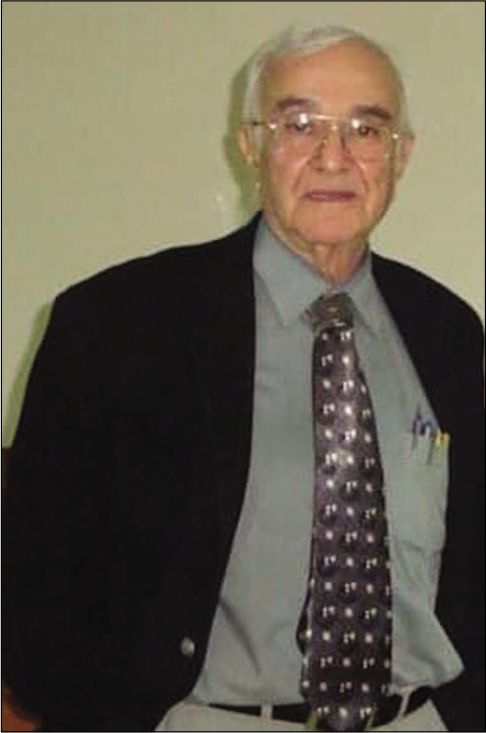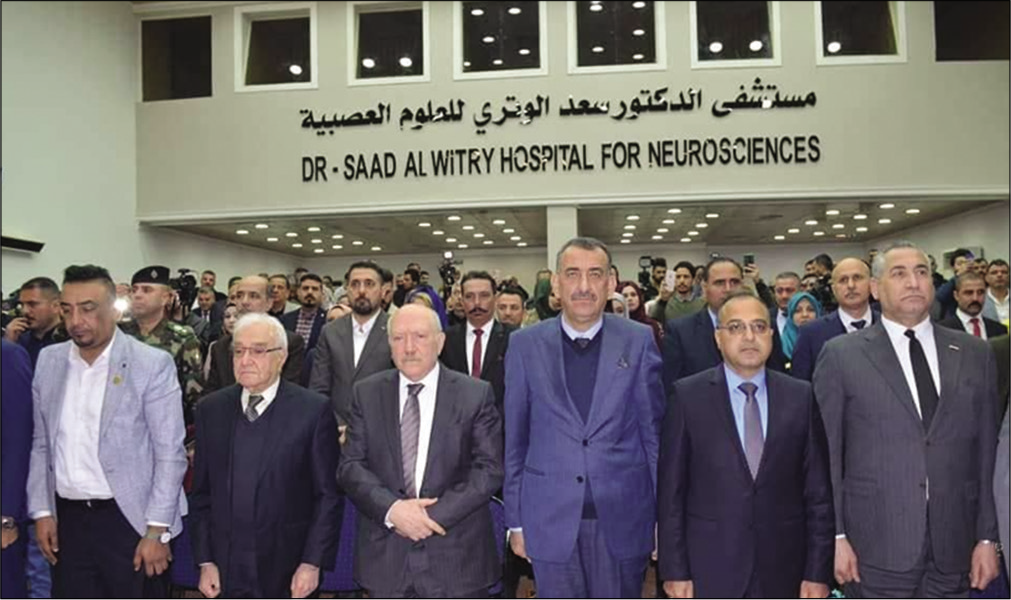- Department of Neurosurgery, Neurosciences Teaching Hospital, Baghdad, Iraq,
- Department of Neurosurgery, Neurosurgery Teaching Hospital, Baghdad, Iraq.
Correspondence Address:
Zahraa F. Al-Sharshahi
Department of Neurosurgery, Neurosurgery Teaching Hospital, Baghdad, Iraq.
DOI:10.25259/SNI_69_2021
Copyright: © 2020 Surgical Neurology International This is an open-access article distributed under the terms of the Creative Commons Attribution-Non Commercial-Share Alike 4.0 License, which allows others to remix, tweak, and build upon the work non-commercially, as long as the author is credited and the new creations are licensed under the identical terms.How to cite this article: J. Al-Khafaji AA1, Hoz SS2, Al-Awadi OM2, Al-Sharshahi ZF2. Alwitri: The father of modern neurosurgery in Iraq. Surg Neurol Int 23-Feb-2021;12:66
How to cite this URL: J. Al-Khafaji AA1, Hoz SS2, Al-Awadi OM2, Al-Sharshahi ZF2. Alwitri: The father of modern neurosurgery in Iraq. Surg Neurol Int 23-Feb-2021;12:66. Available from: https://surgicalneurologyint.com/surgicalint-articles/10601/
INTRODUCTION
Tracking the footprints of neurosurgery founders is of paramount importance, especially in war-ridden countries. Collecting this neurosurgical legacy not only serves to document the contributions of these pioneers to the discipline but also highlights values and replicable steps for leaders of the next generation.
The real birth of modern neurosurgery as an independent specialty took place in 1970 when Dr. Saad Hashim Alwitri [
Alwitri was born in Bagdad in 1933. His father, Dr. Hashim Al-Witri, is accredited with Sir Harry C. Sinderson Pasha (1891–1974) as the founders of the first medical college in Iraq.[
In this paper, we review the extraordinary journey of Alwitri, highlighting the qualities that helped him to win the battle for neurosurgery to find its place in a fragile, war-torn, health-care system.
ESTABLISHING THE FIRST NEUROSURGERY CENTER IN THE REGION
Alwitri’s arrival was the driving force behind the birth of neurosurgery in the region. The first thing he had to do was raise awareness of the need for a well-organized neurosurgery service within both the medical community and the general public to promote the establishment of a specialized hospital dedicated to neurological surgery. In a nation drained by wars and economic sanctions, diverting resources to advanced surgery were not an easy undertaking, and it was necessary to expedite steps to demonstrate the urgent need for service and ensure sustainability.[
Having developed a basic reputation for the specialty, Alwitri was able to secure permission to use the old and now abandoned hospital (Dar Al-Salam, a military hospital), which he renamed as Neurosurgery Teaching Hospital, as the site of his new venture. The hospital was officially founded in 1972, with a budget of 10 thousand Iraqi dinars (equivalent to 32.2 thousands USD at that time) for civil works and was equipped with available X-ray units. There were 100 beds and an operating suite with two operating rooms, including a C-arm, an 8-bed intensive care unit, a physiotherapy unit, and a well-equipped laboratory and pharmacy. Outpatient facilities provided specialist consultation for patients referred from other hospitals, and the hospital offered 24 h emergency services around the year. From its inception until now, the hospital country’s largest tertiary neurosurgery provider and one of the highest case volume neurotrauma referral centers in the region.
At the time of its inauguration, the hospital was staffed by two senior neurosurgeons, one senior assistant, four residents, two anesthetists, a consultant neurologist, and a number of consulting staff from adjacent hospitals. Within 1 year, the first cerebral angiography was performed, a Gamma isotope scanner was added to the diagnostic armament as well as a well-resourced neurophysiology unit, including EMG and EEG equipment with 24 h epilepsy monitoring facilities.
The hospital soon came to be known as a premier health-care provider. It was a teaching center for medical students as well as a training center for general surgeons in neurosurgery, in addition to the training of neurosurgery residents. Special courses on neurosurgery were also offered to nursing personnel. Thanks to him, Bagdad became a center for neurosurgery patients not only in Iraq but also in the Gulf area, in the 1970s and 1980s, with world-class standards at the time.
As the number of homegrown neurosurgeons continued to increase, Alwitri pioneered a national program to establish regional neurosurgery units and appointed neurosurgeons to oversee them. He maintained the standards by direct scientific supervisory over these centers. This program represented a unique initiative and required enormous efforts and leadership skills, especially in a country with notoriously inadequate strategic planning.[
THE ESTABLISHMENT OF THE IRAQI BOARD OF NEUROLOGICAL SURGERY
The Iraqi Board of Neurological Surgery was officially launched in 1991 under the chairmanship of Alwitri. The timeframe was set at 5 years, the training followed a standardized curriculum, and board certification was awarded following a series of rigorous theoretical and practical examinations. A growing number of graduates trained as neurosurgeons and all parts of Iraq were covered by their services.[
To this day, the Iraqi Board of Neurological Surgery is still the main certifier for the profession of neurosurgery in the nation. It has also since been the organizing body for all educational activities, including conferences, seminars, and hands-on courses. Alwitri often used it as a way of embedding core training principles, including upholding standards in all circumstances, doing more with less, reducing service inequality, especially in the remote, less advantaged part of the country, and emphasizing the ethics of the doctor-patient relationship. He greatly valued the latter principle, ensuring that it was a prerequisite of every board graduate; personal feedback from the mentors was used to assess resident’s interactions with the patients and he made sure to evaluate these skills during the viva examinations. His message was that cultivating and harvesting residents’ interpersonal skills to drive patient satisfaction paralleled the value of technical excellence.
THE NEUROSCIENCE CENTER AND HOSPITAL
Having established a background for neurosurgery in the region, Alwitri pioneered the establishment of another hospital, the Neurosciences Teaching Hospital, to be an example of a center of excellence with all advances and a vision for the future.
Locally, this is known as the center that Alwitri “brick-by-brick;” he supervised every step from design with the engineers and the actual construction, he was responsible for assigning administrative tasks and ensuring the viability of the hospital. The hospital had 195 beds including 23 NICU beds and 5 operating rooms. For the 1st time, collaboration was made possible by interdepartmental integration, and simultaneous three-language translation capability was realized.
The hospital was one of its kinds at the time, considering the state-of-the-art facilities, it contained to provide a comprehensive starting point for neurosurgical subspecialties. For example, it was designed as a breeding ground for epilepsy surgery, with the presence of a fully equipped neurophysiological service. Intraoperative angiography, neuronavigation systems, and functional neurosurgery equipment, including stereotactic and deep brain stimulation systems, were also integrated with the operation rooms. Another example is the involvement of neurointervention facilities both as a separate department and as an intraoperative clinic. Stereotactic radiosurgery facilities, which included a built-in Gamma knife facility, and a Linac equipped specifically for conformal radiosurgery and radiotherapy with intensity-modulated radiation therapy capability were installed for the 1st time in the region. The hospital was also the first to host a specialist physiotherapy facility for the recovery of neurosurgical patients. The hospital also hosted subspecialties, such as pediatrics, oncology, and vascular neurosurgery, which is remarkable not only because at that time the concept of neurosurgical subspecialties was not only well-established but also because it took place in a war-torn country.
Thanks to Alwitri, the hospital was formally opened in 2005, amid a great deal of damage and looting during the 2003 war.[
ALWITRI: THE FATHER AND MENTOR
Alwitri has performed all kinds of neurosurgical procedures, and our preliminary statistics shows that he may have achieved record numbers, particularly in specific types of surgeries, such as meningiomas. He was also, like many early neurosurgery pioneers, competent in neurosurgery-related specialties; he was the neuroanesthetist, neurointensivist, neuroradiologist, and neurosurgeon of each case.
His diligent and super-attentive nature has pushed every member of the team to their best potential. In view of his position as leader, he led by example, developed a strict work ethic, and demanded that all his trainees adhere to them. In reality, many of the operating room etiquette rules are now being taught to students and residents in conjunction with unforgettable stories about him.
After retirement, Alwitri has continued to serve as the country’s specialty mentor, offering consultations to neurosurgeons around the country and directing the growing efforts of the Iraqi Association of Neurological Surgeons. He is also well known and respected by the general public such that a layman on the street would equate neurosurgery with his name. He has always been very close to people with the many humanitarian programs he provided in support of the community; “I came back for the poor,” he responded when asked about the achievement he is mostly proud of.
CONCLUSION
Alwitri’s dedication, stick-to-it ness, strong personality, and rigorous neurosurgical training allowed him to advocate for the establishment of neurosurgery at times when it was a distant dream for the country. His superior leadership and interpersonal skills enabled him to lay the foundation and recognition required to transcend political, economic, and cultural boundaries in the way of turning his vision into practice. Alwitri’s career represents a significant turning point in the history of neurosurgery in the Middle East and reveals the impact that one man could have on the history of a specialty.
Declaration of patient consent
Patient’s consent not required as patients identity is not disclosed or compromised.
Financial support and sponsorship
Nil.
Conflicts of interest
There are no conflicts of interest.
References
1. Al Khalili AH. Available from: http://www.cms.hadialkhalili.com [Last accessed on 2021 Jan 21].
2. Al-Fattal S. Sir Harry Sinderson Pasha and Iraq’s first medical school. J Med Biogr. 2013. 21: 164-8
3. Al-Witry H. RCP Museum. Available from: https://www.history.rcplondon.ac.uk/inspiring-physicians/hashim-al-witry [Last accessed on 2021 Jan 24].
4. Hoz SS, Al-Sharshahi ZF, Al-Juboori Z, Albanaa SA, Al-Awadi OM. The history and current status of neurosurgery in Iraq. World Neurosurg. 2020. 140: 353-6
5. Webster P. Medical faculties decimated by violence in Iraq. CMAJ. 2009. 181: 576-8
6. Webster P. Reconstruction efforts in Iraq failing health care. Lancet. 2009. 373: 617-20
7. Webster PC. Iraq’s health system yet to heal from ravages of war. Lancet. 2011. 378: 863-6








HUSSAIN SAHIB
Posted February 24, 2021, 6:59 am
This is a great job in revealing the great effort done by the father of Iraqi neurosurgery .
Khalil jawad
Posted November 1, 2022, 5:05 am
Dear Saad I was certified in neurosurgery in US I moved to Montre where I was honoured as the first noncanadian French speaking neurosurgeon.My story is long as I moved to Glasgow where I got PhD after that with excels in having done apps 1000 operations I switched to radiology. I could not home when you me because I would have in jail or grave. Take care and God bless you.